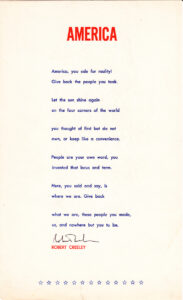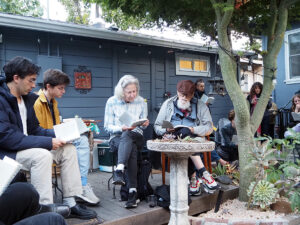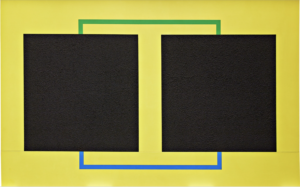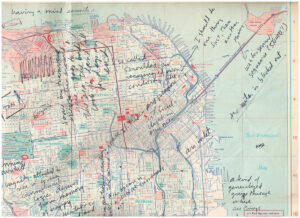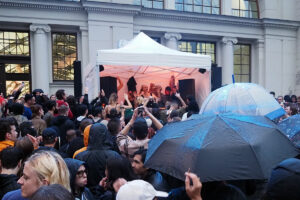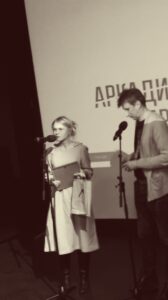For the thousand manifestations that dotted the American landscape yesterday, I want to post this broadside poem by Robert Creeley. It has always seemed a kind lurching effusion of a politics, a consequence of the state of mind he wrote it in without doubt. Creeley was often convulsive, and that is to the point of his aesthetic, even concerning details. But here the subject of his “attack” in William Carlos Williams’s sense is broad, vast, gestural, involuntary. It is worth remembering that much poetry that followed shelters in the shadow of that attack. Thus it bears some comment at a later moment, as late as the one we are in, where the poem resonates anew. … More
Entries tagged with poetry
March 16, 2025
Event 105: Transposition/Recovery
Launch of Barrett Watten,
Not This: Selected Writings
Voznesensky Center, Moscow
46 Bolshaya Ordynka Street
January 24, 2025
The meeting focuses on how American literature experienced a “turn to language” in the 1970s, what the hybrid genres of contemporary poetry are, and the challenges faced by translators working with the “language trend” in literature. (Voznesensky Center announcement)
On the given date, at about 11:30 A.M. from a Detroit suburb, I was transported behind the lines of antagonistic states for a literary evening that, I hoped, would have long-term cultural and political meaning. It was not the first time had I stepped over this line, as I did for our “Summer School” in then-Leningrad, 1989, about which much has been written (including the multi-authored text published in 1991; here). Twenty-seven years later, with Carla Harryman, I traveled to now-St. Petersburg to participate in the Dragomoshchenko Prize awards in 2016. The consequences of these transpositions, as they may be called, between literary and cultural/political realities, continue to expand and be productive as sites of meaning. The turn to language turns out to be more than one thought. … More
August 11, 2024
Entry 60: The Indexical Present II
The photo registers the scene: it is Ron Silliman reading, Krishna Evans following the text. Or perhaps Krishna is reading and Ron is following the text, as will be the case in a minute or two, as soon as Ron finishes his passage. The vantage point is from where I am sitting, having read my part some time ago and now listening as it continues. To the side are Eliot D’Silva next to Ivan Sokolov; then to the right are Jen Hofer, leaning against the garage; Claire Marie Stancek is just behind the forked trunk of a tree; Jennifer Scappettone between the branches of the tree, and Jane Gregory, the host of the event, is to the far right. Continuing out of the picture one would encounter Lytle Shaw, whose elbow is just visible, and then next Syd Staiti on the stairs. Everyone is not especially solemn but bent to the task, reading Lyn Hejinian’s just published Fall Creek (Litmus Press), copies and xeroxes of which are out on the table. All of them have taken their turn. There are thirty-three sections, with Ron and Krishna reading the next-to-final two, before the group takes up the last section in unison. This was my proposal to the group at the break, recalling the pleasure of cacophony in our Grand Piano reading of “A”–24, whose plurivocality Lyn internalized and, some decades later, realized in one of her last works. … More
February 11, 2024
Document 102: Note on Conduit
“Conduit” (“Kanal svyazi”)
trans. Arkadii Dragomoshchenko and Vladimir Feshchenko
Vsealizm (Moscow), 11 February 2024
From Moscow, for the second week in a row, comes a new translation of my work into Russian—here, “Conduit” into “Kanal svyazi”—in preparation for a bilingual edition to appear, one hopes, later this year. This work, brought forward over decades and across continents, truly stands as a conduit in the distressed conditions of communication, between the “territories of the East” and the rest of the world assuredly, but more generally as “what we live.” As I wrote on receiving word of this wonder:
There was a line from a Poets Theater play, Third Man by Carla Harryman, early 80s, spoken by Eileen Corder: “Go ahead, Moscow—I’m listening!” That was transgressive in the Reagan Era; in the current moment, one listens carefully to say the least. And now this translation of my poem “Conduit” has appeared—it is all about receiving messages, and not letting them stand as commonplaces or placeholders but as samples of “systematic distortion.” It’s about the “systematic distortion” of communication as communication itself, which we experience every day.
November 14, 2023
Entry 54: The Transmission of Poetry
MATERIAL TRANSMISSIONS:
DEMOTIC SURREALISM/HIERATIC LANGUAGE,
SAN FRANCISCO, 1975–1980
Plunged each day into the fog of received ideas, man is led to conceive
of all things and to conceive of himself through a dizzy series of quickly
hidden stumblings, of false steps rectified as best as possible.
—André Breton, “The Automatic Message” (1933)
September 2, 2023
Entry 51: Magnetic North (IV)
Friday, June 16
DB ICE 1040 Bergen auf Rügen > Berlin Hbf
54 Ebertystraße, Friedrichshain, Berlin
Carla Harryman
Ragna Berg
Florian Werner
Ellen Allien
Hamburger Bahnhof
Just about to get there; we have been away. Time crosses space, beginning in Rügen Island and ending in Berlin. Then we were advised to come and we would arrive. The party crowd is aware of its having a location in time and space, had been there for awhile—before we came. The party crowd at the Hamburger Bahnhof, celebrating the new director, a new orientation for art. As we come from a distance, the music invites us in, not yet there. On arrival it is there, an insistent pulse, meditative, cruising on horizontal, an endless plane of immanence, synced in time. He is coming soon, wrote Wittgenstein; he will be coming, he will have come. That must be the new director. Then he will have arrived. Gertrude Stein repeated the phrase, only with modulation. Ellen Allien is the legitimate appointee of the new director, hired to entertain and inspire the crowd, to be a work of art in herself. The party crowd is a work of art in itself, an instance of Gertrude Stein advancing in time. As the director himself had written, “The limits of my language mean the limits of my world“—that is the principle of new art at the Hamburger Bahnhof. It is raining, the crowd is moving slightly then more openly, Ellen Allien gestures to the sky, arms raised, rain is coming down. A steady pulse of the language of limits becomes an episode in time and space. We are not afraid of speaking.
A man coming.
Yes there is a great deal of use in a man coming but will he come at all if he does come will he come here.
How to you like it if he comes and look like that. Not at all later. Well anyway he does come and if he likes it he will come again.
Later when another man comes
He does not come.
Girls coming. There is no use in girls coming.
Well anyway he does come and if he likes it he will coming gain.Ellen Allien is the legitimate heir of Gertrude Stein. Nonsense, she pushes a button and there is a new orientation to the beat. Nonsense. Pulse, difference. Slight movements under an umbrella, the umbrellas are folded. We learn the new meaning to experience time and space, under the auspices of the new director, as an example of the new art. The art is coming all over with newness, like Gertrude Stein coming to Radcliffe, GIs arriving in the Bavarian Alps. The movement begins with a slight dancing, becomes more pronounced, is shared by many in the crowd. Finding a position in the middle, unable to really get a look at Ellen Allien, stepping back, her arms are raised with the beat. And a gigantic pause makes ensuing pulse more danceable, this is the basic grammar of techno. Nonsense. Now take a position a bit farther back, focus and click. On the pause that makes the pulse happen. Let us say what Ellen Allien teaches: electronic dance music teaches. She is the instructor of the moment, hired by the director, as an example of the new art. Her whole life is oriented toward this moment of instruction, in the form of a work of art, a way of being historical. This is the mandate of the Nationalgalerie der Gegenwart: to preserve the present as ethical obligation in the form of Ellen Allien and the crowd, moving under rain, skies now clearing, continuing as may be, a work of art.
March 26, 2022
Document 97: xxx / Ekaterina Zakharkiv
xxx
by Ekaterina Zakharkiv
(trans. Joseph Simas)
fucking sky: because it is open, it is occupied, recognized as an extremist organization, acting as a foreign agent, banned across the territory of the russian federation.
discrediting actions
with the help of words. how do you act on the sky with words?
don’t look up, don’t cross its borders, don’t read paul celan under its vaulted blanket.
the sky before dawn is buzzing, collapsing without warning.
it’s no longer a metaphor, no longer a generalization of conflict.
blinded, we roll into the sleepy suburbs and strike. we harm the defenseless.
we lose our sense of smell and fail to notice the stench of black smoke.
we get caught off guard in the mix.
now is not the time for quotations. all the marks have been forged into antitank hedgehogs. nevertheless
days go by, and we lay never-roses at the foot of myth. what have we seen with our own eyes? transmissions, streamed from a billion bloodlines. childhood dreams burgeoning into political imagination in airports and hotel rooms. craters blown into our former tongue suck up shards of grass, hallways blasted in. language is tongue-tied. it leaves neither trace of name nor address. in its vacant alleyways the hissing utterances of an orange serpent. no one’s, again … More
March 21, 2022
Document 96: To Russian/Ukrainian Poets
From Scales (11)
by Carla Harryman
to Russian/Ukrainian Poets
—checking email every five minutes for an answer. I got it I got the answer and it didn’t make me look so good.
Pounding on your own goodness sounds a bit tarnishing.
Say stinging.
Have a latke.
The smell of onion in the vapor of potato reminds me of the Russian poets in our kitchen drinking vodka at a somewhat earlier hour than this.
They did not sleep.
They do not sleep much now either.
Up all night in your fantasy. Some of them dead.
No not in mine. In mine they sleep willowy sorts of idealisms smothering vast plains sequestered in small farms and mushroom gathering.
They are almost all gone now, but there are more.
Some. Alexei. Others too are lauded on the lips of the still living.
Alexei turned vitriol blue.
Hmmm . . . I thought it was a reference to hydrated copper.
Ukrainian rubble recalls each dead poet in Russia as Ukrainian.
They have to be careful now. That rubble disseminates in the elements spreading across the globe.
As ever but more so.
Tabling the turn and turning.
So. Let them leave as they did.
They leave again and again.
So and so is arriving.
A ways off.
They are arriving.
We break hearts with them when they arrive with stoic pretense.
And then we get out the vodka.
They have not yet slept.
We keep the vodka in the freezer in case someone is looking for it.
I confess I didn’t understand entirely, these males. But Alexei—
Now understanding, forget.
—I was a poet in the company of Alexei.
The point is disbursed in rubble—
Yes forget understanding.
—and never made again in the same way.
That’s right. It’s missing varnish.
—March 20, 2022 … More
January 23, 2022
Entry 45: Writing in the Event
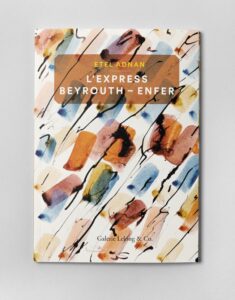 Writing in the Event:
Writing in the Event:
“The Beirut/Hell Remix
(After Etel Adnan)”
Last October I had the good fortune to preview Etel Adnan: Light’s New Measure, the Guggenheim Museum’s career retrospective of Adnan’s visual art, which makes significant reference to her writing. The cross-genre and multi-languaged aspects of her work could not be missed, an opening beyond the usual categories that art history and museum curating maintain. The museum was also making a political point in showing Adnan’s work along with a deep selection of the abstract painting of Vasily Kandinsky. The move from landscape to abstraction unites the two, but the differing contexts for abstraction are equally the point. Eurocentric modernism is in transition, refunctioned as a global cosmopolitanism, which arrives with the breakthrough moment of Adnan’s painting at dOCUMENTA 13 (2012) at what I have described as a “global archive.”
The occasion itself was compelling and bittersweet. Etel herself could not attend the opening but was represented by her partner, Simone Fattal—whose solo show at the Whitechapel Gallery in London was also on the global agenda. With Carla Harryman, we made plans to meet in Paris in November; we would have a French Thanksgiving, the day after the American one. Etel Adnan died on November 14, a Saturday. The news came through friends the next day. From all corners and all kinds of people the reaction was profound: the passing of a figure who had touched many, over many decades. We would still be coming to Paris as travel was arranged and plans had been made; the Omicron curtain had not yet come down. Everything was up in the air, suspended. Simone texted after we arrived; will you still be coming to dinner? Meetings with a remarkable woman on the rue Madame. We discussed everything and nothing as friends came and went. One resonant detail concerned Etel’s daily attention to events in Beirut, from economic collapse to the 2020 explosion. Not coincidentally, the Institut du Monde Arabe was exhibiting visual art referencing Beirut before and after the explosion under the title “Lumières du Liban,” in which Etel and Simone were both strongly present. We told Simone we would attend, and reported back after we did.
The museum bookstore stocks an impressive array of titles by Adnan, in many languages. I was immediately taken by Galerie Lelong’s 2021 publication of L’Express Beirut–Enfer, which brought together three texts, the first originally written in French and then later published in her English version. Meanwhile, plans that had been under way at the Guggenheim Museum were also up in the air, with the news of Etel’s passing, the onset of the Omicron surge, and the Guggenheim’s new partnership with the Academy of American Poets. In the end, I would agree to provide a written work, on commission, for the tribute to Etel, to be published online in conjunction with a virtual reading by poets who could perform in New York. Both events took place: the reading, while impeded by some gapping due to bandwidth issues, features an epochal performance by Anne Waldman along with tributes by Ammiel Alcalay, Omar Berrada, Stephen Motika, and Asiya Wadud, made available on Vimeo. And my text, “The Beirut–Hell Remix (After Etel Adnan),” along with an explanatory note that appears at the end of the poem, is published at the link below. One can only hope that, in future days, the many facets of this event for Etel Adnan will be seen together.
“The Beirut–Hell Remix (After Etel Adnan)” [link]
Original by Etel Adnan composed 1970; first published 1971
Adaptation/translation by Barrett Watten; completed January 2022
Online publication by The Guggenheim Museum, January 2022
Notes and links
[t/k]
August 21, 2021
Archive 14: World Autobiography
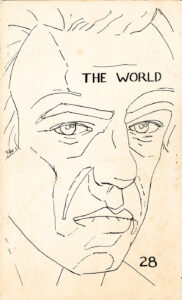 I return to the vexed question of autobiography, which in earlier times I believed one should “start writing” only when all other options—of world transformation, for instance—had failed. The two key terms are brought together in the 1973 cover of The World 28, the “Autobiography Issue” edited by Lewis Warsh. As I recalled when Lewis died late last year, I first met him in Mendocino, on his way down the coast to Bolinas, where I visited him before he moved back east. In his editing of The World, he wanted to radicalize autobiography not as a genre but as a mode of writing. Writing from an immediate perspective of “personhood” in any genre was of interest, from poetry to fiction to memoir, journal entries, letters, portraits, and snapshots.
I return to the vexed question of autobiography, which in earlier times I believed one should “start writing” only when all other options—of world transformation, for instance—had failed. The two key terms are brought together in the 1973 cover of The World 28, the “Autobiography Issue” edited by Lewis Warsh. As I recalled when Lewis died late last year, I first met him in Mendocino, on his way down the coast to Bolinas, where I visited him before he moved back east. In his editing of The World, he wanted to radicalize autobiography not as a genre but as a mode of writing. Writing from an immediate perspective of “personhood” in any genre was of interest, from poetry to fiction to memoir, journal entries, letters, portraits, and snapshots.
Autobiography would be the royal road to writing per se; there was a tradition and consensus that “self/life/writing” was what there was to do, in fact was all that could be done. For a brief while there was in fact a kind of period style of autobiographical self-discovery, nothing like the persona poems of the workshop but evoking a tradition from Rousseau and the romantics, Zukofsky’s “the words are my life,” Beat spontaneity, and New York School everyday life. The consensus—and it was not long lived—was that “into the company of self it all returns,” one might say. Warsh’s 1973 project, bringing together writers of several diverse schools, was the highpoint of that moment.
I was the early Language writer in that group, in company with Clark Coolidge, Bernadette Mayer, Tom Raworth, Bobbie Louise Hawkins, Bill Berkson, Anne Waldman, all poets who would appear in the first issues of This, but also Diane Di Prima, Kenward Elmslie, Lee Harwood, Harris Schiff, and John Wieners. The issue should be reprinted in its entirety, to reflect on the question of writing that Lewis proposed: where the fact of writing and the events of life are seen as nearly identical. What historical circumstances obtained for that to be possible, desirable, likely? But there is also a moment of transition here: from person to language—at one pole the iconic representation of personhood, in condensed and presentable form, and on the other the endlessness of scribbling in letters and journals, a fascination of writing per se. … More
